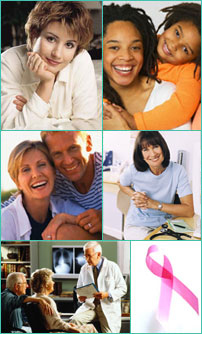You have tremendous power to influence your health, including your risk of developing breast cancer. The key is to embrace and nurture that power. Dietary and lifestyle choices top the list of factors you can control.
Below are the most important lifestyle choices you can make to decrease your risk of breast cancer, and you have the power to do each of them!
Achieve and maintain a healthy body weight. If you are overweight, especially after menopause, take steps to lose the extra pounds. Losing weight will not only help protect you against developing a wide range of disease, from diabetes to different cancers, it will improve your quality of life!
Consume less animal fat. Women who eat less fat have lower risk of breast cancer. Opt for more vegetarian sources of protein, such as legumes. Choose lower-fat animal products, such as chicken without skin. Switch to skim milk.
Consume more soy foods. Women from Asian countries consume higher amounts of soy foods than women in the United States and have a lower risk of breast cancer. Try soy milk on your cereal, and tofu in stir-fry and pastas. Soy milk and tofu are more protective than are highly processed soy foods.
Consume at least 10 servings of fruits and vegetables each day. People whose diet is abundant in fruits and vegetables have lower risk of cancer, including breast cancer. Choose a variety of colors of produce to get the most benefit. An orange with breakfast, apple for mid-morning snack, tossed salad and mixed fruit for lunch, raw veggies for an afternoon snack, two types of vegetables for supper, and a late-night banana add up to 10 servings of fruit and vegetables.
If you drink alcohol, do so in moderation. Overall, women drinking 2 to 4 alcoholic drinks (where a drink is defined as 5 ounces of wine, 12 ounces of beer, or 1 ounce of liquor) per day had a 40% greater risk of breast cancer than did non-drinkers. Some studies show that even one glass of wine or one bottle of beer per day increases the risk by 9% more than that of non-drinkers.
Consume 25-35 grams of fiber each day. Legumes (dried beans and peas such as black beans, garbanzo beans, lentils and split peas) contain more fiber than any other type of food. Include legumes in your rice dishes, salads, or soups. Whole-grain cereals are also a good source of fiber; check the label for the exact fiber content. Whenever you increase your fiber intake, you also need to drink adequate fluids. At least 64 ounces of water each day is recommended.
Drink tea instead of coffee. Both green and black tea appear to be protective.
Choose less-processed foods. Go for fresh fruit, brown rice instead of boxed mixes, homemade soups, and your own frozen dinners made from your leftovers.
Don't smoke. Although the verdict is still out on the link between smoking and breast cancer, tobacco is known to cause other cancers, notably lung cancer. But the bottom line is, smoking is not good for you; it sabotages your overall health and well being. If you smoke, get help and quit! (Easier said than done, but you can do it!)
Get regular exercise. Exercise is one of the greatest gifts you can give your body and mind. Also, exercise can help protect you against a number of diseases, including breast cancer. Consider this: older women who exercise may be less likely than their inactive peers to develop breast cancer. Women who biked or walked for more than an hour each day had a 19% reduction in their odds of developing breast cancer. Another study demonstrated that women who exercised 3 to 5 hours per week had a lower risk of mortality from breast cancer than did women who exercised less than 1 hour per week.
Make time for at least 15 minutes each day when you can relax. Mediation, deep breathing, and yoga are all wonderful options to help maintain balance.
Commit yourself to a diligent screening regimen. Be sure to do monthly self breast exams and get annual mammograms. Your best defense against breast cancer is early detection, and appropriate and timely treatment if the disease is detected.
Having a child before you are 30 and breast feeding are two factors which are known to decrease risk, and these are two factors you may be able to control. But does this mean you should make these decisions based on breast cancer risk? Absolutely not! If a woman decides to have a child, she should do so on her and her partnerís terms. Of course, childbirth can be planned, but it is not something that can be pre-scheduled, and definitely not something that should be forced or rushed to make a cut-off date. The stress of a hasty or ill-founded decision is potentially far more damaging than giving birth after 35. Breastfeeding is also a very personal decision. It works with some woman and not for others. If you opt to breastfeed your child, do so because it is the best option for you and your baby, not because it might have a small impact on your risk of getting breast cancer later. Remember, both of these factors are but two of many factors that contribute to a womanís breast cancer risk.
|


